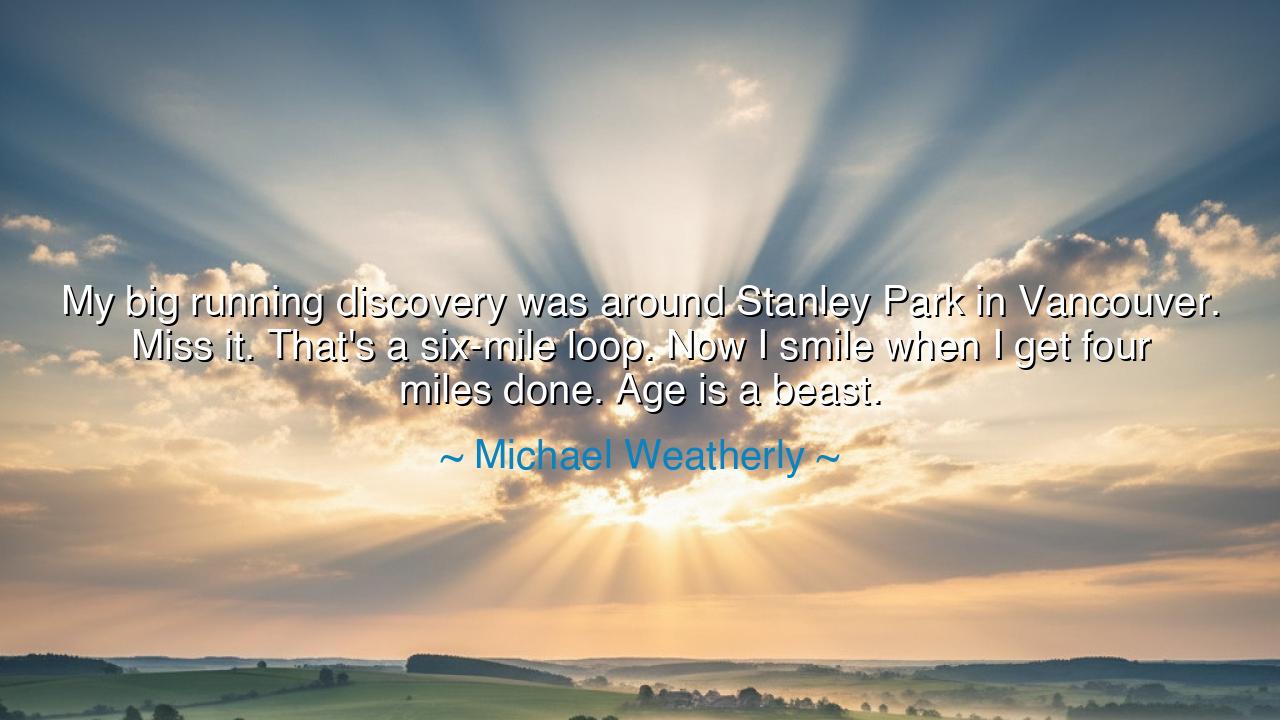
My big running discovery was around Stanley Park in Vancouver.
My big running discovery was around Stanley Park in Vancouver. Miss it. That's a six-mile loop. Now I smile when I get four miles done. Age is a beast.






In the words of Michael Weatherly, we find a reflection that is both humble and profound: “My big running discovery was around Stanley Park in Vancouver. Miss it. That's a six-mile loop. Now I smile when I get four miles done. Age is a beast.” Though spoken casually, these words strike deep into the timeless human struggle against time, strength, and the acceptance of limits. They remind us that what once was easy becomes difficult, and yet joy can still be found in the smaller victories of life.
The six-mile loop around Stanley Park, which Weatherly remembers with longing, symbolizes the days of youth, when energy seemed endless and the body felt like an unbreakable vessel. To conquer that distance was not only a feat of fitness, but a declaration of vitality. Yet, as he admits, age is a beast—unyielding, silent, and relentless. No runner, no king, no warrior escapes its touch. Muscles grow weary, endurance shortens, and what once was conquered must now be cherished in smaller portions.
But the heart of his words lies not in loss, but in transformation. Where once he measured his joy by six miles, now he says: “I smile when I get four miles done.” This is wisdom. For the ancients taught that the secret of endurance is not to cling stubbornly to the past, but to embrace the present with gratitude. The true warrior does not mourn what he can no longer do—he honors what he still can. To smile at four miles instead of despairing over six is to stand with dignity before the beast of age.
History offers us kindred examples. Think of the great Athenian statesman Pericles. In his youth, he was fierce in debate, commanding the people with unmatched eloquence. Yet in his later years, when illness took his strength, he found pride not in new victories, but in the enduring legacy of the democracy he helped shape. Like Weatherly, he smiled not because his power was untouched, but because he found meaning in what remained. Age, though a beast, can teach humility and gratitude to those wise enough to listen.
There is also a heroic tenderness in Weatherly’s confession. To smile at the completion of four miles is to affirm that joy is still possible, even when the body falters. It is to say: “Though I cannot do as I once did, I will still celebrate what I can.” This is the essence of resilience, the art of aging well. For bitterness hardens the heart, but gratitude softens it, allowing one to keep running—perhaps slower, perhaps shorter—but always forward.
The lesson here is clear: do not measure your worth by past triumphs alone. Life is not diminished because your distances shorten or your pace slows. Instead, measure your worth by the courage with which you meet the present moment. Like Weatherly, learn to smile at what you achieve today, even if it is less than yesterday. For age may indeed be a beast, but gratitude is the sword that tames it.
So, beloved, take this wisdom with you: embrace the smaller victories, honor the strength that remains, and never cease to smile at the road you can still walk—or run. The six-mile loop may belong to the past, but the four miles of today are no less worthy of celebration. Age will come, but it cannot steal the joy of one who has learned to treasure each step as a gift. For in the end, the greatest triumph is not






AAdministratorAdministrator
Welcome, honored guests. Please leave a comment, we will respond soon